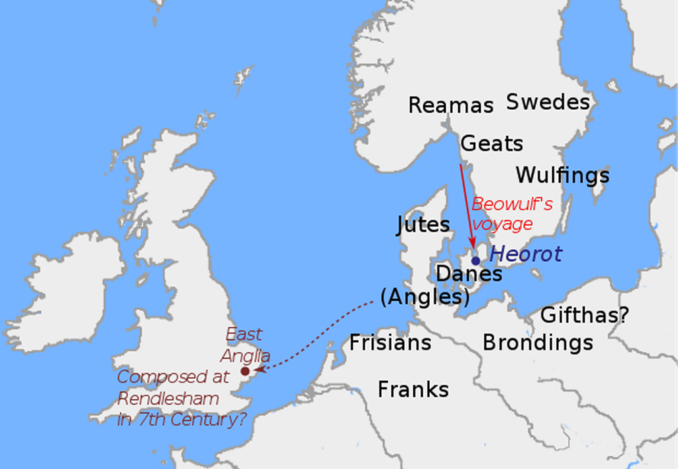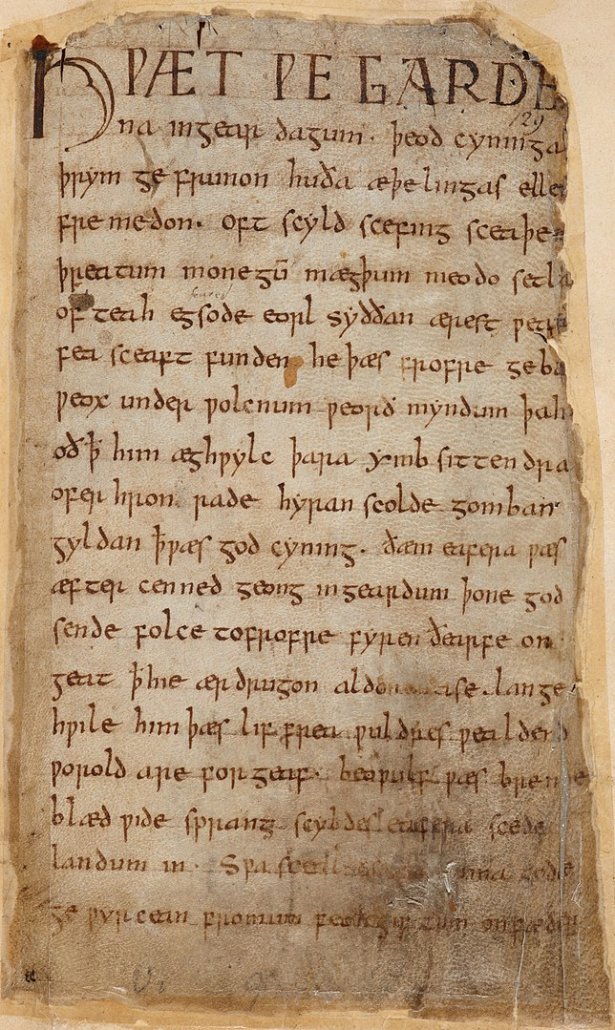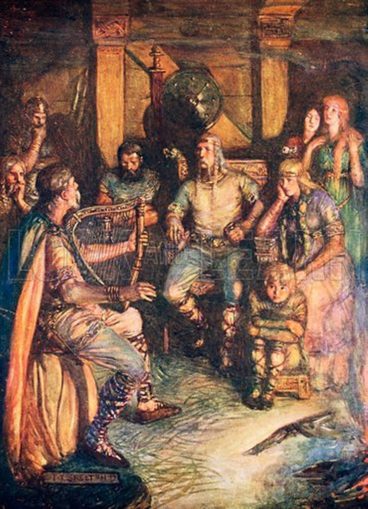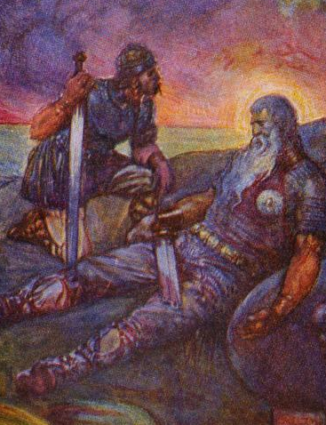
Ian Alexander, CC BY-SA 4.0, via Wikimedia Commons
Beowulf is min namen
It was a recent post about zombies tearing off arms (of which more later) which reminded me of the three year bane of my life when I read English Literature – Old English. This was the mid-1960s and, as they say, “The past is another country: they do things differently there”, like making Old English compulsory throughout an English course, or expelling female students for wearing trousers, or for jumping in the Trafalgar Square fountains!
But I digress. I was made to learn Old English in order to read a handful of poems and a historical chronicle or two. The worst of these for me was “Beowulf”. Not only is it over 3000 lines long, but I would suggest that the subject matter is very much an acquired taste. The title is the only Old English I remember from those three long painful years.

anonymous Anglo-Saxon poet, Public domain, via Wikimedia Commons
Nevertheless, it is the literature of our direct ancestors (before our land was stolen by the Norman French), and, as such, we should perhaps, for patriotic reasons if for nothing else, make the effort to understand the way they thought and viewed their world.
I should clarify that Old English is not the language of Chaucer, as some may assume. The latter is Middle English (around 300 years later), which I was much happier to learn, as, let’s face it, the stories are so much better.
Beowulf was probably originally passed down orally, and, from the subject matter, was first voiced by a bard in the early 6th Century AD, and was not written down until around the 10th, when two monastic scribes produced the only known manuscript, mostly written in the Wessex Old English dialect, although it may well have originally been composed in the Northumbrian or Mercian dialect.
In reading the ode, it should be remembered that it was composed in the Dark Ages (with apologies to any woke readers), when these islands were singularly light on any form of literature, primarily because so very few people were literate and the only scribes were in the monasteries.
The plot takes place in Heorot, the mead hall of King Hrothgar of the Spear Danes (Southern coastal Denmark). A mead hall was where the king and his thanes ate and (mostly) drank before taking off their armour and sleeping on the benches. This mead hall was very luxurious for the times, with tapestries and cloth of gold.
The luxury of Heorot attracted the local monster, Grendel, who lived in the local swamp, and came to the hall every night attacking Hrothgar’s thanes, killing thirty of them, so that eventually no one dare stay there overnight.
This problem had gone on for twelve years before Beowulf, nephew of the King of the Geats (possibly Goths) from Southern Sweden heard about it and set sail for Sweden with fourteen of his thanes. Beowulf owed Hrothgar an enormous favour because he had paid “blood money” on behalf of Beowulf’s father, when he had killed someone several years earlier and lacked the funds to prevent a blood feud. Beowulf arrived, and, when challenged by the coast guard, uttered the immortal words of the title. (The hero’s name means “bee wolf” or “bear.)

Joseph Ratcliffe Skelton, Public domain, via Wikimedia Commons
Hrothgar, by now elderly, warmly welcomed Beowulf. Having been feted and receiving many valuable presents (as was customary), Beowulf waited alone in the mead hall at dead of night for Grendel, eschewing weapons because he believed he was so strong that he simply did not need them to defeat a mere monster.
As soon as Grendel arrived, Beowulf despatched him by tearing off his arm. (And, as we used to say, to keep ourselves sane, “hitting him with the soggy end”.) Grendel ran away (minus arm) mortally wounded.
All would have been well if Grendel had not had a mother, who, understandably, was not best pleased that her only offspring had been taken away from her, and subsequently died in her under water lair. The thanes were not too worried about her as she was “a mere woman”. Little did they know!
Grendel’s mum, therefore, decided to take her revenge by returning to the mead hall and killing the thanes she found there, including Hrothgar’s favourite, AEschere, devouring him and carrying her son’s arm back to her lair.
Beowulf followed her to her lair at the bottom of a lake. It was so deep it took him half a day to get to the bottom, and he had to slay many sea monsters en route. At first, it looked as though the “mere female” would get the better of him, but, after quite a struggle, he managed to despatch her with a giant’s sword he found handing on the wall. Her blood was so poisonous that it melted the blade. He cut off her head as well as that of Grendel, whose body he found in her lair. When he returned to the mead hall, he presented the two heads and Grendel’s arm to King Hrothgar, and was well rewarded for his troubles.
Beowulf returned to Geatland, and eventually became king. He ruled for 50 years, until a local dragon became a “pain in the neck”, after an outlaw had stolen a golden chalice from his cave. When the dragon found out, he was, naturally not best pleased and laid waste to the countryside with his flames.
Eventually, Beowulf set off with his thanes to despatch the dragon. When they got close to the cave, Beowulf’s thanes were afraid and ran away, but Beowulf stood his ground and slayed the dragon, unfortunately not before the dragon bit him, fatally poisoning him. Fortunately, he had taken the precaution of making a final speech before entering the cave.
As befitted a famous warrior and king, Beowulf’s body was cremated on a large pyre surrounded by armour and precious items, overlooking the sea. As he had requested, the remains were buried in a large barrow on the headland.

Illustrated by J.R. Skelton, Public domain, via Wikimedia Commons
Not a great plot for us today, (pace J.R.R. Tolkien), but full of allegory for the Anglo Saxons. Beowulf was a great warrior, but suffered from the sin of hubris, so much so that, he thought he could single-handedly slay a monster. What had undoubtedly started as a pagan epic was eventually only committed to manuscript when English society had been Christianised. By then, Grendel had become a descendant of Cain.
And what of my struggle with Old English? I have to report that I failed every single Old English exam over the three years at college, but, as I said at the beginning, “The past is another country”, and it never held me back.
© Chrissie 2021
The Goodnight Vienna Audio file
Audio Player



